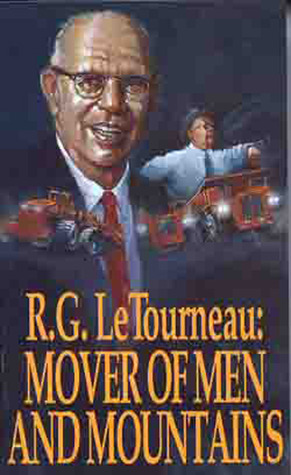 “Mover of Men and Mountains”, by R.G. LeTourneau was one of the first Christian books I read as a teenager. I will never forget the occasion…
“Mover of Men and Mountains”, by R.G. LeTourneau was one of the first Christian books I read as a teenager. I will never forget the occasion…
I was invited by my church youth leader to go down to Lake Samish and waterski for the weekend. He had set up a slalom course on the lake and he was going to take the weekend to show me how to ski a course. I must have been about 15 at the time.
Over the course of the weekend we talked about many things; many of which I have no recollection of. However, he also gave me a copy of LeTourneau’s book with the recommendation that it was an excellent book about a businessman walking with Jesus wholeheartedly.
Why on earth would a youth leader think that was a good book to give to a 15 year old? I don’t know, but it clearly made a positive impression on me.
I remember being struck by LeTourneau’s big thinking and by his radical trust in and obedience to Jesus. He truly was an amazing man. According to Wikipedia:
“Robert Gilmour LeTourneau (November 30, 1888 – June 1, 1969), was born in Richford, Vermont, and was a prolific inventor of earthmoving machinery. His machines represented nearly 70 percent of the earthmoving equipment and engineering vehicles used during World War II, and over the course of his life he secured nearly 300 patents. With the help of his wife, the late Evelyn Peterson (1900-1987), he founded LeTourneau University, a private, Christian institution, in Longview, Texas. LeTourneau was widely known as a devoted Christian and generous philanthropist to Christian causes, including the “LeTourneau Christian Center” camp and conference grounds in Rushville, New York. LeTourneau was often referred to by his contemporaries as ‘God’s businessman.’”
He is remembered for many incredible accomplishments, but there is one of his quotes that has stuck in my psyche over the years,
“It’s not about how much of my money I give to God, but how much of God’s money I keep for myself.”
R.G. LeTourneau knew that everything he had was from God.
The Lord tells us in Deuteronomy 8:18 that He is the one who gives us the ability to produce wealth. LeTourneau knew that. He knew that his or anyone’s ability to produce wealth is from God. He also believed that a man’s faith must impact his wallet.
It’s really all a matter of trust isn’t it? Do we trust that God is the one who gives us the ability to produce wealth; that He is the one who provides for all of our needs, and, therefore, we can freely give of our finances as an act of worship to Him? Or, do we not trust the Lord to provide for us and, therefore, have to provide for ourselves?
I believe that tithing 10% of our gross income (pre-tax) – the Bible calls this our “first fruits” – is the basic responsibility of every follower of Jesus. Gifts and offerings are in addition to that.
It’s all a matter of trust: do I trust the Lord to provide for all my needs? That is why giving of our finances is an act of worship. It’s saying, “Lord I believe you will take care of me.”
I have heard some people say that they cannot afford to tithe. I believe we cannot afford not to tithe. Do you know that tithing is actually a form of spiritual warfare?
Listen to what the Lord says in Malachi 3:9-11,
“’You are cursed with a curse, for you are robbing Me, the whole nation of you! Bring the whole tithe into the storehouse, so that there may be food in My house, and test Me now in this,’ says the Lord of hosts, ‘if I will not open for you the windows of heaven and pour out for you a blessing until it overflows. Then I will rebuke the devourer for you, so that it will not destroy the fruits of the ground; nor will your vine in the field cast its grapes,’ says the Lord of hosts.” (NASB)
When we tithe, the Lord “rebukes the devourer”. We can’t afford not to tithe: when we don’t, we’re cursed.
Whose money is it anyway? It’s the Lord’s, and “…it’s not about how much of my money I give to God, but how much of God’s money I keep for myself.”
2 Corinthians 9:2-8
“Remember this: Whoever sows sparingly will also reap sparingly, and whoever sows generously will also reap generously. Each of you should give what you have decided in your heart to give, not reluctantly or under compulsion, for God loves a cheerful giver. And God is able to bless you abundantly, so that in all things at all times, having all that you need, you will abound in every good work.”